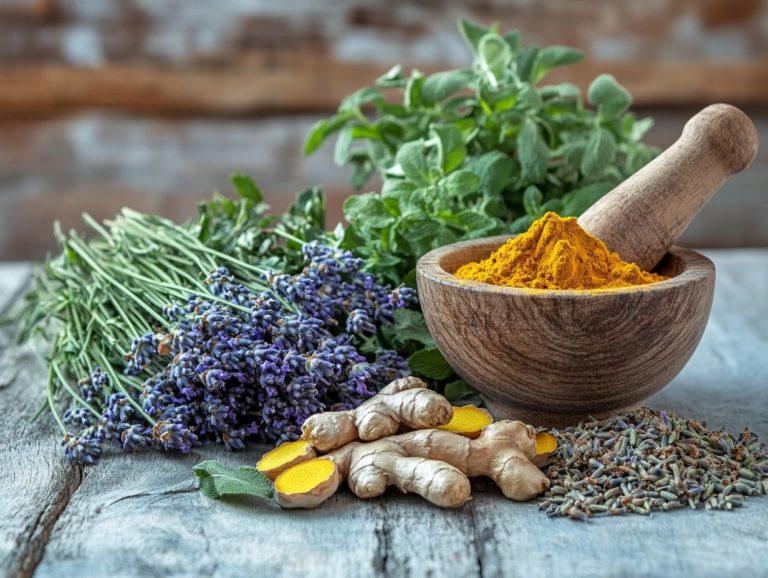How to Balance Herbal Remedies with Conventional Medicine?
In the ever-evolving landscape of healthcare, you might be excited to explore herbal remedies alongside conventional medicine in your quest for holistic healing. This article delves into the definitions and distinctions between these two approaches, shedding light on the potential benefits that arise from their synergy, including improved treatment outcomes.
However, it s crucial to weigh the risks as well, particularly the possible interactions between these remedies. You ll be guided on how to safely integrate these options with the support of healthcare providers. Discover inspiring case studies that illustrate successful outcomes.
Join in as you navigate this captivating intersection of traditional and modern medicine.
Contents
- Key Takeaways:
- Understanding Herbal Remedies and Conventional Medicine
- Benefits of Combining Herbal Remedies and Conventional Medicine
- Risks and Considerations of Combining Treatments
- How to Safely Integrate Herbal Remedies with Conventional Medicine
- Examples of Successful Integration
- Frequently Asked Questions
- Can I use herbal remedies alongside my conventional medicine?
- How do I know if my herbal remedies will interact with my conventional medicine?
- Are there any risks associated with combining herbal remedies and conventional medicine?
- Can I stop taking my conventional medicine if I start using herbal remedies?
- How can I ensure I am balancing herbal remedies and conventional medicine safely?
- Are there any precautions I should take when using herbal remedies with conventional medicine?
Key Takeaways:

- Understanding the definitions and differences between herbal remedies and conventional medicine helps you integrate them safely.
- Combining both treatments can lead to synergistic effects and enhanced treatment; it s important to consider potential risks and communicate with healthcare providers.
- Proper communication and monitoring with healthcare providers, along with adjusting treatment plans when necessary, can result in successful integration of herbal remedies and conventional medicine.
Understanding Herbal Remedies and Conventional Medicine
Understanding herbal remedies alongside conventional medicine is crucial for you as a patient seeking holistic health solutions. This is especially relevant when exploring options like complementary and alternative medicine (CAM) that can be used alongside standard medical care.
Herbal remedies, which might encompass natural treatments such as St. John’s Wort and Ayurvedic Medicine, provide a range of medicinal benefits that can effectively support traditional therapies. To understand how herbal remedies work, it’s important to consider their intersection with conventional approaches, which has the potential to enhance your overall health outcomes, particularly in cancer treatment scenarios where integrative medicine strategies are gaining significant traction.
Definitions and Differences
Herbal remedies and conventional medicine represent two distinct approaches to healthcare, each with its unique philosophy. Herbal remedies emphasize natural solutions derived from plants, while conventional medicine leans on pharmaceuticals and scientifically validated treatments.
Throughout history, herbal remedies have been utilized for millennia, originating from ancient civilizations that revered the healing properties of plants as essential to their wellness practices. These remedies are founded on traditional knowledge, often passed down through generations, underscoring the profound connection between nature and health.
Conversely, conventional medicine, which has gained prominence over the past few centuries, focuses on rigorous scientific research and clinical trials to validate treatment effectiveness. While herbal remedies adopt a holistic perspective considering the whole person and their environment, conventional medicine typically targets specific symptoms or diseases through standardized protocols. If you’re wondering can I combine herbal remedies with other treatments?, it’s important to consult healthcare professionals for tailored advice.
Grasping these differences can illuminate the rising interest in complementary and alternative medicine, as many individuals seek to blend the strengths of both approaches for a more balanced health experience. Understanding how to safely mix different herbal remedies is crucial in this journey.
Benefits of Combining Herbal Remedies and Conventional Medicine
By combining herbal remedies with conventional medicine, you can create synergistic effects that enhance treatment strategies, tapping into the strengths of both approaches. Consider the benefits of mind-body therapies and dietary supplements, which can significantly improve patient outcomes.
This integrative medicine approach not only respects your preferences but also opens the door to incorporating proven methods into clinical trials. In doing so, you contribute to expanding the landscape of cancer treatment and addressing other persistent symptoms effectively.
Synergistic Effects and Enhanced Treatment

The synergistic effects of combining herbal medicine with conventional treatment options can elevate patient outcomes, especially in areas like pain management and symptom relief.
A testimonial from a cancer patient shows how adding ginger supplements not only eased nausea from chemotherapy but also enhanced energy levels.
This holistic approach tackles immediate symptoms while nurturing long-term wellness. It underscores the importance of adopting a well-rounded view on health that blends conventional and herbal strategies for effective results.
Risks and Considerations of Combining Treatments
Combining herbal remedies with conventional medicine offers benefits. However, be aware of potential interactions and side effects.
Medical professionals must navigate these complexities to ensure safety and craft personalized treatment plans, especially in cancer therapy. You deserve to understand how these elements can work together.
Possible Interactions and Side Effects
When contemplating the integration of herbal remedies with conventional medicine, it s vital to be aware of potential interactions and side effects. These can vary significantly based on the specific herbs and medications involved.
For instance, herbs like St. John s Wort can diminish the effectiveness of certain antidepressants and oral contraceptives. On the other hand, ginkgo biloba may elevate bleeding risks, especially for those taking anticoagulants.
Engage in an open dialogue with your healthcare provider about any herbal supplements you are considering. This can help you avoid adverse reactions and create a safe treatment plan tailored to your needs. A comprehensive understanding of these potential interactions, including herbal medicine dosage and interaction awareness, empowers you, enabling informed choices about your health.
How to Safely Integrate Herbal Remedies with Conventional Medicine
Integrating herbal remedies with conventional medicine requires an open line of communication with your healthcare providers. This dialogue is essential for monitoring and adjusting treatment plans, ensuring a holistic approach that prioritizes your safety and well-being.
By working closely with medical professionals, you can navigate the intricacies of combining complementary and alternative medicine (CAM) practices with standard medical care while staying informed about potential interactions and side effects. This thoughtful partnership empowers you to make informed decisions about your health, including whether herbal remedies can replace prescription meds.
Communication with Healthcare Providers

Effective communication with your healthcare providers is crucial for blending herbal remedies with conventional medicine. This ensures that your treatment plans are safe and tailored to your individual needs.
One effective strategy is to prepare a comprehensive health history that outlines your previous medical conditions, procedures, and any supplements you’re currently using. By being upfront about these details, you enable your healthcare providers to make informed decisions regarding herbal supplements. Additionally, it’s important to consider what you should know before using herbal remedies to ensure safety and effectiveness.
Discussing all current medications, both prescriptions and over-the-counter drugs, prevents any adverse interactions. Engaging in open conversations about your desired outcomes from using herbal remedies fosters trust and paves the way for a collaborative approach to your treatment journey, especially when considering safety tips for creating herbal remedies.
Monitoring and Adjusting Treatment Plans
Regularly monitoring and adjusting treatment plans is crucial when integrating herbal remedies with conventional medicine. This approach helps achieve the best patient outcomes and ensures safety.
This process relies on collaboration. Engage actively with your healthcare providers by sharing feedback about your experiences and any side effects you may encounter. Effective communication allows healthcare professionals to tailor treatments to your needs, making necessary adjustments that reflect your evolving health status.
By emphasizing regular health assessments, you and your providers can create a comprehensive and effective care plan. This partnership maximizes the benefits of both herbal and conventional therapies while minimizing potential risks, ensuring a holistic approach to your well-being.
Examples of Successful Integration
Numerous examples showcase how herbal remedies and conventional medicine can work together successfully. A wealth of case studies and testimonials highlight positive outcomes of such approaches.
Consider the use of cannabis in cancer treatment or the role of chiropractic therapy in managing persistent symptoms. These instances illuminate the potential benefits that arise when patients and medical professionals collaborate on integrative medicine strategies, especially when understanding how herbal remedies interact with alcohol.
Case Studies and Testimonials
Case studies and testimonials provide compelling illustrations of how herbal remedies can connect with conventional medicine, showcasing real-world outcomes that bolster patient confidence.
In detailed narratives, patients share how specific herbal formulations have enhanced their treatment journeys, reducing conditions like chronic pain and anxiety. For example, a recent study highlighted a patient who added turmeric supplements to her prescribed regimen for rheumatoid arthritis, leading to significant reductions in inflammation and pain. To ensure safe and effective use, it’s important to understand what are the best practices for herbal remedy use.
Testimonials reveal personal journeys where individuals describe how incorporating herbs like ashwagandha enhanced their mental resilience and complemented their conventional medications. These accounts underscore the tangible benefits of such integrations and emphasize a holistic approach to wellness that many actively seek.
Frequently Asked Questions

Can I use herbal remedies alongside my conventional medicine?
Yes, you can use herbal remedies alongside conventional medicine. Always consult with a healthcare professional before doing so!
How do I know if my herbal remedies will interact with my conventional medicine?
Some herbal remedies may interact with certain medications. It s vital to do thorough research or consult with a healthcare professional before using them together.
Are there any risks associated with combining herbal remedies and conventional medicine?
Yes, there are risks involved with using herbal remedies alongside conventional medicine, such as potential interactions or side effects. Always talk to your doctor or pharmacist before combining the two.
Can I stop taking my conventional medicine if I start using herbal remedies?
No, you should never stop taking prescribed medication without consulting your doctor first. Herbal remedies may offer additional benefits, but they should not replace conventional medicine.
How can I ensure I am balancing herbal remedies and conventional medicine safely?
The best way to ensure safe use of both herbal remedies and conventional medicine is to communicate openly with your healthcare provider. Follow their recommendations for personalized advice and monitor for any potential interactions or side effects.
Are there any precautions I should take when using herbal remedies with conventional medicine?
Yes, disclose all herbal remedies you are using to your healthcare provider. Start with small doses of the herbs to see how your body reacts. If you experience any adverse effects, stop using the herbs and consult your doctor.
For personalized advice, reach out to your healthcare provider or a local herbalist!






